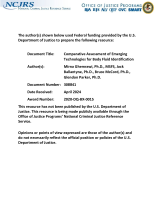Heuristic pairwise alignment of de Bruijn graphs to facilitate simultaneous transcript discovery in related organisms from RNA-Seq data
Journal
BMC Genomics
Date Published
November 2015
Agencies
NIJ-Sponsored
Publication Type
Research (Applied/Empirical)




